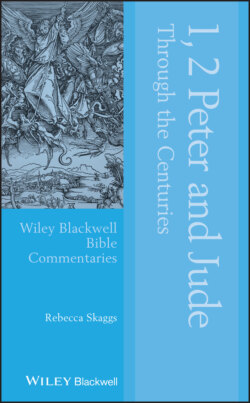Читать книгу 1, 2 Peter and Jude Through the Centuries - Rebecca Skaggs - Страница 55
Doctrinal Interpretations: Eternal Security
ОглавлениеPerseverance of the saints (sometimes referred to as “eternal security” or “once saved, always saved”) is a teaching which claims that if someone is truly “born of God” nothing or no one can take away that salvation (Rom. 8:39). Sometimes this theory is held along with the idea that no one can bring about his own transformation, the same way no one can take away another’s salvation. In some cases, this theory is based on 1 Peter.
Classical Calvinism maintains that God has elected certain individuals to eternal salvation and hence, by implication, has elected others to damnation. Many Pauline passages are used to support this position, as are verses from 1 Peter (1:1–2:10), particularly the ones which speak of “election” (1:2; 2:15; 2:4–12).
The Westminster Confession of Faith (1647, Chapter XVII) uses 2:5 to support the statement about perseverance of the saints:
They whom God hath accepted as his beloved, effectively called, sanctified by his Spirit can neither totally, nor finally, fall away from the state of grace. (Pelikan II, IV: 626)
The Canons of Dort (1618, chapter 5) articulates the traditional Calvinist doctrine of perseverance, as does the Baptist Confession of Faith (1689, chapter 17). Other reformed confessions include it as well, but it should be noted that it is not officially an integral part of Reformed systematic theology (e.g. it does not even have a section heading in the three‐volume Systematic Theology by Hodge). Most theologians, however, would consider that it necessarily follows from traditional Calvinism.
The Particular Baptists (emerged around 1616) adhered to the doctrine of a particular atonement – that Christ died only for the elect – and state their position as, “Those that have this precious faith wrought in them by the Spirit, can never finally nor totally fall away [1 Pet. 1:4–6]” (Pelikan III, V: 56). On the other hand, the New Hampshire Baptist Convention Declaration of Faith (1833) apparently reconsidered and concluded that there is some cooperation between God and the sinner: “In order to be saved, sinners must be regenerated, or born again … so as to secure our voluntary obedience to the gospel [1 Pet 1: 22–5]” (Pelikan III, V: 245).
It may be helpful to distinguish between the doctrine of “Perseverance of the Saints” and the doctrine of “Assurance” which describes how we may be assured of our salvation and inheritance, as in 1 Peter 1–2. The Westminster Confession of Faith (1647) makes this distinction between “Grace and Salvation” (see chapter 18).
